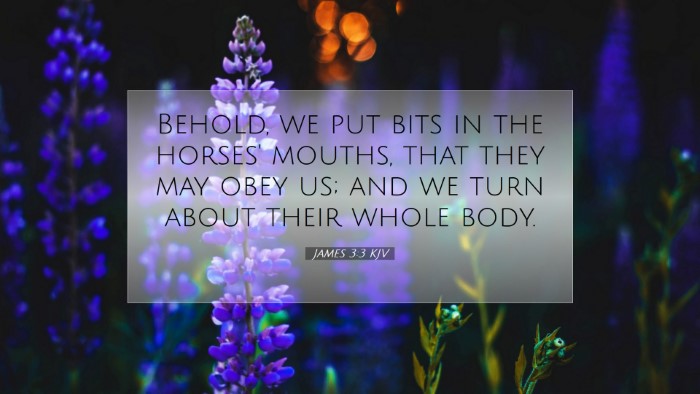Old Testament
Genesis Exodus Leviticus Numbers Deuteronomy Joshua Judges Ruth 1 Samuel 2 Samuel 1 Kings 2 Kings 1 Chronicles 2 Chronicles Ezra Nehemiah Esther Job Psalms Proverbs Ecclesiastes Song of Solomon Isaiah Jeremiah Lamentations Ezekiel Daniel Hosea Joel Amos Obadiah Jonah Micah Nahum Habakkuk Zephaniah Haggai Zechariah MalachiJames 3:3
James 3:3 KJV
Behold, we put bits in the horses' mouths, that they may obey us; and we turn about their whole body.
James 3:3 Bible Commentary
Commentary on James 3:3
The verse James 3:3 states: "Indeed, we put bits in horses' mouths that they may obey us, and we turn their whole body." This metaphor serves as a profound illustration of the power that small things can hold over larger entities. Below, we present a comprehensive commentary drawing from the insights of esteemed public domain commentaries.
Introduction
The Book of James is authored by James the Just, who emphasizes practical Christianity. James addresses various aspects of faith, behavior, and the power of speech throughout his epistle. In James 3, he delves into the subject of the tongue, highlighting its capacity for both good and evil.
The Nature of the Tongue
In this context, the tongue is likened to the bit in a horse's mouth. Just as a bit can control the direction of a massive animal with minimal effort, our words can steer our lives and the lives of others. This similarity emphasizes that:
- Control: The tongue, despite its small size, holds tremendous influence over our actions and the overall course of our lives (Barnes).
- Direction: The bit directs the horse’s movements, akin to how our speech guides our decisions and relationships (Clarke).
- Obedience: The ability to control the horse’s body exemplifies the need for obedience in our lives as guided by the words we speak (Henry).
The Symbolism of the Bit
Matthew Henry provides a profound analysis of the bit's symbolism, noting that it represents:
- Authority: The rider exerts authority over the horse, paralleling how our words can command respect or obedience from others.
- Discipline: The training and discipline required to use the horse effectively reflect the need for self-control in our speech.
- Influence: Just as the horse may not understand the bit's purpose but learns to follow through experience, so too must individuals recognize the implications of their words.
The Implications of Control
Adam Clarke emphasizes the importance of self-control over the tongue:
- Self-Regulation: The exhortation involves regulating one’s speech to avoid discord and strife within the community.
- Reflection on Character: The manner in which one speaks serves as a reflection of one's character and faith. Thus, the bit becomes a metaphor for moral responsibility.
- Spiritual Growth: Mastery of the tongue leads to greater maturity in the Christian faith, indicating a deeper understanding of God’s Word.
The Broader Context of James 3
The context of James 3 illustrates the responsibility that comes with being a teacher and the potential for the tongue to cause destruction. The chapter continues to explore the dual nature of speech and how it can either glorify God or lead to chaos and conflict.
- Teachers and Accountability: James warns that not many should aspire to be teachers due to the stricter judgment they will face because of their words.
- Words of Life and Death: The tongue has the capacity to build up or tear down, suggestive of Proverbs 18:21, which states, "Death and life are in the power of the tongue."
- Bridling the Tongue: The necessity of bridle in controlling speech is continuously highlighted, serving as a call to vigilance in both public and private discourse.
Theological Insights and Applications
For pastors, students, theologians, and Bible scholars, this verse invites deep theological reflection and practical application:
- Spiritual Discipline: Regular self-examination regarding what is spoken can lead to spiritual growth and improved relationships.
- Corporate Worship: Promoting edifying speech within the church reflects the character of Christ and strengthens communal ties.
- Evangelism: Words can be used to share the Gospel effectively, thus encouraging believers to utilize their speech for the glory of God.
- Conflict Resolution: Understanding the power of speech could serve as a tool for resolving conflicts in a manner that fosters unity and love.
Conclusion
James 3:3 serves as a transformative reminder of the significant impact our words have on ourselves and those around us. By reflecting on the control exemplified in the use of a bit for horses, believers can appreciate the necessity of speaking with wisdom and grace. Each insight extracted from the commentaries enhances our understanding of this verse and solidifies its relevance in our daily lives.


